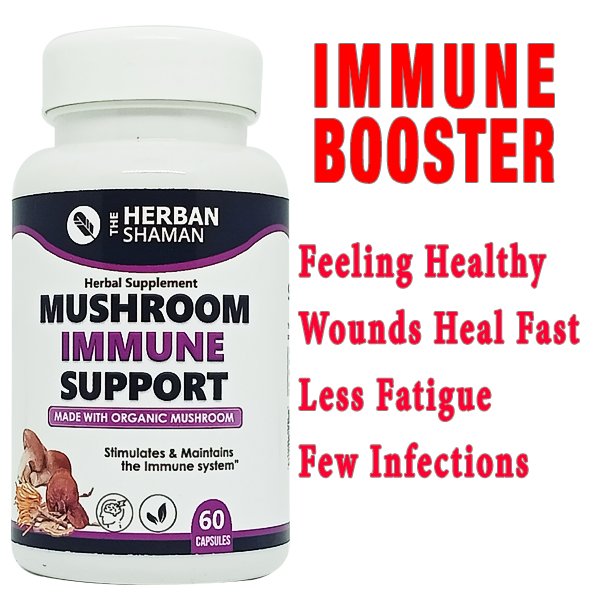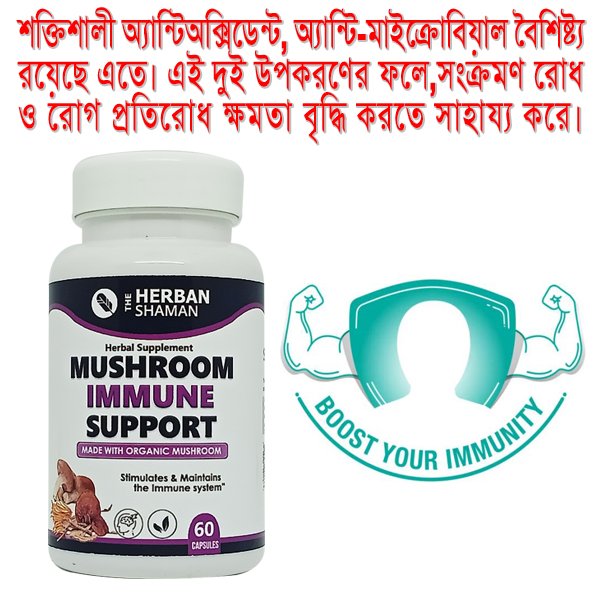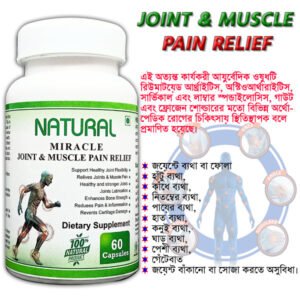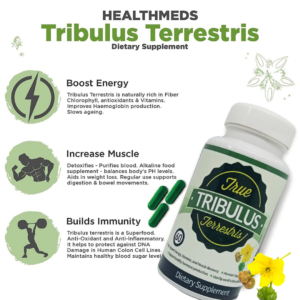Mushroom Immune Support
These supplements are derived from various types of mushrooms, each with its own unique properties that can benefit the immune system.
₩45,000 ₩50,000
The Benefits of Mushroom Immune Support Supplements
When it comes to maintaining a healthy immune system, many people turn to natural supplements to support their body’s defense mechanisms. One such supplement that has gained popularity in recent years is mushroom immune support supplements. These supplements are derived from various types of mushrooms, each with its own unique properties that can benefit the immune system.
Understanding Mushroom Immune Support Supplements
Mushroom immune support supplements are formulated using extracts from different types of mushrooms, such as reishi, shiitake, maitake, and turkey tail mushrooms. These mushrooms are known for their immune-boosting properties and have been used in traditional medicine practices for centuries.
One of the key components of mushroom immune support supplements is beta-glucans, which are polysaccharides found in the cell walls of mushrooms. Beta-glucans have been studied for their potential to modulate the immune system and enhance its response to infections and other challenges.
Additionally, mushrooms are rich in antioxidants, vitamins, and minerals that can further support overall health and well-being. These supplements are often available in various forms, including capsules, powders, and tinctures, making them convenient for individuals with different preferences.
The Potential Health Benefits of Mushroom Immune Support Supplements
Research on the health benefits of mushroom immune support supplements is ongoing, but several potential advantages have been identified:
1. Immune System Support
One of the primary reasons people turn to mushroom immune support supplements is for their potential to strengthen the immune system. The beta-glucans and other bioactive compounds in mushrooms may help enhance the body’s natural defense mechanisms, making it more resilient against pathogens and environmental stressors.
2. Antioxidant Properties
Mushrooms are rich in antioxidants, such as ergothioneine and selenium, which can help protect the body from oxidative stress and damage caused by free radicals. By reducing oxidative stress, mushroom immune support supplements may contribute to overall health and longevity.
3. Anti-Inflammatory Effects
Some mushrooms have been studied for their potential anti-inflammatory effects, which could be beneficial for individuals dealing with chronic inflammation-related conditions. By modulating the body’s inflammatory response, mushroom immune support supplements may help alleviate symptoms and promote a balanced immune system.
4. Gut Health Support
The health of the gut microbiota is closely linked to immune function, and certain mushrooms may have prebiotic effects that support the growth of beneficial gut bacteria. By promoting a healthy gut environment, mushroom immune support supplements may indirectly contribute to immune system health.
5. Adaptogenic Properties
Some mushrooms are classified as adaptogens, which means they may help the body adapt to stress and maintain homeostasis. By supporting the body’s stress response mechanisms, mushroom immune support supplements could have a positive impact on overall immune function.
Choosing a High-Quality Mushroom Immune Support Supplement
With the growing popularity of mushroom immune support supplements, it’s important to select a high-quality product that offers the greatest potential benefits. Here are some factors to consider when choosing a mushroom immune support supplement:
1. Mushroom Variety
Look for supplements that contain a diverse range of mushroom species, as each type may offer unique bioactive compounds and health benefits. A combination of different mushrooms can provide comprehensive support for the immune system.
2. Extraction Method
The method used to extract the beneficial compounds from the mushrooms can impact the potency and bioavailability of the supplement. Look for products that use extraction methods designed to preserve the bioactive components of the mushrooms.
3. Third-Party Testing
Choose supplements that have been tested by third-party organizations for quality, purity, and potency. This can provide assurance that the product contains the specified ingredients in the stated amounts, without contaminants or fillers.
4. Organic and Sustainable Sourcing
Opt for supplements that are made from organically grown mushrooms and sourced sustainably. Organic cultivation practices and sustainable sourcing help ensure that the mushrooms are free from pesticides, heavy metals, and other harmful substances.
5. Transparent Labeling
Check the product label for transparency regarding the mushroom species used, the concentration of active compounds, and any additional ingredients. Transparent labeling allows consumers to make informed decisions about the supplements they choose.
Incorporating Mushroom Immune Support Supplements into Your Routine
Before incorporating any new supplement into your routine, it’s advisable to consult with a healthcare professional, especially if you have any underlying health conditions or are taking medications. Once you have the green light, incorporating mushroom immune support supplements into your daily regimen can be straightforward.
Many mushroom immune support supplements come in easy-to-consume forms, such as capsules or powders that can be added to smoothies or beverages. Following the recommended dosage provided by the manufacturer is essential to ensure safe and effective use of the supplement.
It’s important to note that while mushroom immune support supplements can play a supportive role in maintaining a healthy immune system, they are not a substitute for a balanced diet, regular exercise, and other healthy lifestyle practices. A holistic approach to health, including a nutrient-rich diet and adequate sleep, is essential for overall well-being.
Conclusion
Mushroom immune support supplements offer a natural and potentially effective way to bolster the body’s immune defenses. With their rich array of bioactive compounds and potential health benefits, these supplements have garnered attention as a complementary approach to immune system support. By choosing high-quality products and incorporating them into a holistic wellness routine, individuals can harness the potential of mushroom immune support supplements to promote overall health and vitality.
The Multifaceted Benefits of Mushroom Immune Support Supplements
Mushroom immune support supplements have gained significant attention in the wellness community due to their diverse range of potential health benefits. Beyond their direct impact on the immune system, these supplements have been studied for their ability to support various aspects of overall health and well-being.
Cognitive Function and Brain Health
Interestingly, certain mushroom species used in immune support supplements have also been linked to cognitive function and brain health. For example, the lion’s mane mushroom (Hericium erinaceus) has been the subject of numerous studies exploring its neuroprotective properties.
Research suggests that the bioactive compounds found in lion’s mane, such as hericenones and erinacines, may have the ability to stimulate the growth and repair of nerve cells, a process known as neurogenesis. This could potentially enhance cognitive abilities, improve memory, and support overall brain function.
Additionally, the anti-inflammatory and antioxidant properties of some mushrooms may help protect the brain from oxidative stress and age-related cognitive decline. By promoting a healthy brain environment, mushroom immune support supplements may contribute to improved mental clarity, focus, and cognitive resilience.
Cardiovascular Health Support
Mushroom immune support supplements may also offer benefits for cardiovascular health. Several studies have investigated the potential of certain mushroom species to support heart health through various mechanisms.
One of the ways mushrooms may contribute to cardiovascular well-being is by positively influencing cholesterol levels. Compounds found in mushrooms, such as statins, have been shown to have a similar effect to pharmaceutical statins in lowering LDL (bad) cholesterol and increasing HDL (good) cholesterol.
Furthermore, mushrooms are rich in antioxidants and anti-inflammatory compounds, which may help reduce the risk of atherosclerosis, the buildup of plaque in the arteries. By improving endothelial function and reducing inflammation, mushroom immune support supplements may support overall cardiovascular health and potentially lower the risk of heart disease.
Stress Management and Adaptogenic Properties
In addition to their immune-boosting capabilities, some mushroom species are also classified as adaptogens, which means they may help the body adapt to and manage stress more effectively.
Adaptogens are natural compounds that can help the body maintain homeostasis, or a state of balance, even in the face of various stressors. Certain mushrooms, such as reishi and cordyceps, have been studied for their potential adaptogenic properties, suggesting they may help the body cope with physical, mental, and emotional stress.
By supporting the body’s stress response systems, mushroom immune support supplements may contribute to improved mood, better sleep, and enhanced overall well-being. This can be particularly beneficial for individuals experiencing chronic stress, which can have detrimental effects on the immune system and overall health.
Cancer Prevention and Support
Emerging research has also explored the potential of mushroom immune support supplements in the context of cancer prevention and support. Certain mushroom species have been studied for their potential to inhibit the growth and spread of cancer cells, as well as their ability to enhance the effectiveness of conventional cancer treatments.
For example, the reishi mushroom (Ganoderma lucidum) has been the subject of numerous studies for its potential anti-cancer properties. Compounds found in reishi, such as triterpenes and polysaccharides, have been shown to exhibit cytotoxic effects on various types of cancer cells, potentially slowing or preventing tumor growth.
Additionally, some studies have suggested that the immunomodulatory effects of mushroom compounds may enhance the body’s natural defenses against cancer, potentially improving the efficacy of cancer treatments and reducing the risk of recurrence.
It’s important to note that while these findings are promising, more research is still needed to fully understand the role of mushroom supplements in cancer prevention and treatment. Individuals with cancer or at high risk should consult with their healthcare providers before incorporating these supplements into their regimen.
Gut Health and Microbiome Support
The gut microbiome, the diverse community of microorganisms that reside in the digestive tract, plays a crucial role in overall health, including immune function. Interestingly, certain mushroom species have been studied for their potential to support gut health and the balance of the microbiome.
Mushrooms, particularly those with prebiotic properties, such as the turkey tail mushroom (Trametes versicolor), may help nourish the growth of beneficial gut bacteria. These prebiotic compounds can serve as food for the gut microbiome, promoting a healthy and diverse microbial community.
By supporting the gut microbiome, mushroom immune support supplements may indirectly contribute to a stronger and more resilient immune system. The gut-immune axis, the intricate relationship between the gut and the immune system, is well-established, and maintaining a balanced gut microbiome can have far-reaching effects on overall health.
Skin and Wound Healing
Interestingly, some mushroom species have also been studied for their potential benefits in supporting skin health and wound healing. The bioactive compounds found in certain mushrooms, such as polysaccharides and triterpenes, have been shown to exhibit anti-inflammatory, antimicrobial, and wound-healing properties.
For example, the chaga mushroom (Inonotus obliquus) has been studied for its potential to accelerate wound healing and reduce inflammation in the skin. The antioxidant and antimicrobial properties of chaga may help protect the skin from environmental stressors and promote a healthy, balanced skin microbiome.</








There are no reviews yet.